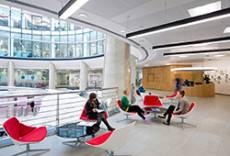May 2, 2014
New report aims to guide future direction of facilities management
 The Royal Institution of Chartered Surveyors (RICS) has published a new report authored by Dr Matthew Tucker of Liverpool John Moores University which aims to help shape the future direction and policy of the facilities management sector in the UK. Balancing the performance scorecard: how to maximise customer feedback in Facilities Management develops a customer performance measurement framework for facilities management based on a range of critical themes which emerged from the vast amounts of qualitative data collected across 23 in-depth interviews with a diverse range of FM professionals. The interview subjects came from both an in-house and outsourced background and across a range of business sectors. The report claims to offer a key set of recommendations to enable facilities managers to maximise their ability to capture customer feedback to improve the provision of space and facilities.
The Royal Institution of Chartered Surveyors (RICS) has published a new report authored by Dr Matthew Tucker of Liverpool John Moores University which aims to help shape the future direction and policy of the facilities management sector in the UK. Balancing the performance scorecard: how to maximise customer feedback in Facilities Management develops a customer performance measurement framework for facilities management based on a range of critical themes which emerged from the vast amounts of qualitative data collected across 23 in-depth interviews with a diverse range of FM professionals. The interview subjects came from both an in-house and outsourced background and across a range of business sectors. The report claims to offer a key set of recommendations to enable facilities managers to maximise their ability to capture customer feedback to improve the provision of space and facilities.

























March 25, 2014
The workplace should be designed for (and by) people, not robots
by Simon Heath • Comment, Facilities management, Technology, Workplace design
(more…)